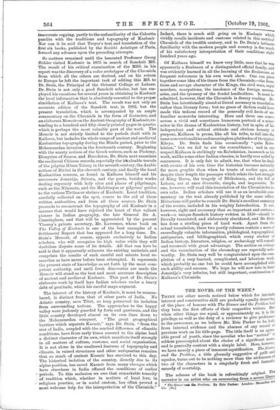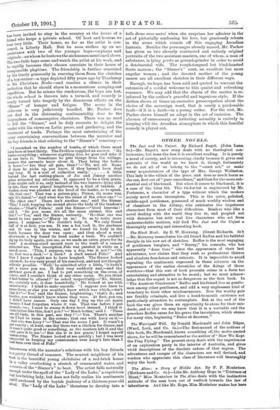THE NO V EL OF THE WEEK.*
THERE are other novels noticed below which for intrinsic interest and constructive skill are probably equally deserting of the place of honour with The Sinner and the Problem had they been the first efforts of their respective writers. But when other things are equal, or approximately so, it is the privilege as well as the duty of a reviewer to give preference to the newcomer, as we believe Mr. Eric Parker to be, both from internal evidence and the absence of any record of previous work on his title-page. The title itself is an agree- able proof of youth, since the novelist who has " arrived " is seldom preoccupied about the choice of a significant name,- and is generally content with a simple label. Here, however, we have merely a piece of innocent mystification. The Sinner and the Problem, a title gloomily suggestive of guilt ana squalor, turns out to be nothing more than the nicknames of two of the characters in a singularly fresh and fantastic comedy of courtship.
The scheme of the book is refreshingly original The narrator is an artist who on recovering from a severe &es! • The Sinner Cu Pm Problem. By Eric- Parker. London : Macmillan and than been invited to stay in the country at the house of a friend who keeps a private school Of host and hostess we hear very little. Their house, so far as the artist is con- aerned, is Liberty Hall. But he soon strikes up an ac- • tanoe with two of the younger boys—orphans and originals.—en whom he bestows the nicknames mentioned above. The two little boys come and watch the artist at his work, and he rapidly becomes their chosen associate in their hours of irresponsible playtime. The friendship is further cemented by his timely generosity in rescuing them from the clutches of a boy-usurer--a type depicted fifty years ago by Thackeray in his Christmas Books—and reaches a climax in their invitation that he should share in a momentous camping-out expedition. But he misses the rendezvous, the boys are lost, the whole school is thrown into a turmoil, and comedy is nearly turned into tragedy by the disastrous effects on the Sinner" of hunger and fatigue. The scene in the sickroom is very judiciously handled. Mr. Parker does not deal in the distressing sentimentality dear to the biographers of consumptive choristers. There was no need to kill the "Sinner," and he duly recovers to delight the reader with his views on Latin prose, and gardening, and the treatment of toads. Perhaps the most entertaining of the many entertaining conversations between the narrator and his boy friends is that relating to the " Sinner's " cemetery:—
" I remarked on the number of tombs, of which there must have been at least thirty. The Problem supplied an answer. He buries everything; whenever anything dies, he goes and asks if he can have it. Sometimes be gets things from the village. because the servants know about it. They bring the bodies in boxes.'—' Are they all pets, then ? No, not all. Some of them he picks up, you know, if they haven't been dead
very long. It is a sort of collection really.' A little beyond the last resting-places of Joe and Jimmy another grave attracted my attention. It appeared to be a twin grave, if one might call it so, only instead of the two barrows lying side by side, they were placed lengthwise in a kind of tandem. A wooden cross was planted at the head of the leader, so to speak. 'Oh, that one? That was a guinea-pig ; Prince, its name was, only it's faded.'—' And what was the name of the other one ?'- 'The The other one ? There isn't another one,' said the Sinner. 'This,' I said, tapping the mound above the body of the tandem's wheeler.—' That's Prince,' said the Sinner.—' Good heavens ! ' said L Do you mean it's all the same animal, this and that?'—' Yes,' said the Sinner, seriously. It—that one was buried in two parts.'—' Mercy on us ! So as to make more -graves, I suppose.'—' We couldn't help it. We only found half of it at first, you see. It was a fox took it, the gardener said. It was in the winter, and we found its body in the hutch because the door was open ; and then about a week afterwards a boy found its head under a bush. We couldn't dig up its body again, you see, so we made an extra grave for its bead.' A medium-sized mound next to the tomb of a canary attracted me. The inscription Pido was painted in white on a tarred cross. This, I suppose, was a dog, was it not ? Oh no; that was a duck.'—' A duck ? A. duck named Fido ? ' And then I knew I ought not to have laughed. The Sinner looked ashamed; be was very proud of his cemetery, and had not thought ridicule possible. 'Well,' he admitted after a little, it hadn't -got a name you see. It died very suddenly and,—and the gardener gave it me. I had to put something on the cross, of course, and I couldn't think of any other name. Do you think it had better be altered ?' he asked respectfully.—`No, Sinner, no; certainly not; it does beautifully.' He looked at me with uncertainty. I tried to make amends. I suppose you have to name them, or else you wouldn't know which was which,—isn't that it ?'—' Yes,' said the Sinner, brightening; that's it; and besides, you wouldn't know where they were. At first, you see, I didn't have names. Only one day I dug up the cat again because I had forgotten where it was. That was before I put mounds, too ; I used to stamp it down level instead. I think it looks better like this, don't you?'—' Much better,' said I. These are all birds, in this part, are they Yes. There's another one I had to name in the corner; that one with Lucy on it.'— And who was Lucy ? '= That was the name I put. It wasn't a pet exactly ; at least, one day there was a chicken for dinner, and It wasn't quite good or something, so the masters left it and the cook gave it to me:—' But she is in her grave,' I found myself murmuring. The Sinner looked at me quickly ; but I was more suocessful in keeping my countenance over Lucy's fate than I had been over that of Fido."
Interwoven with the narrator's relations with his boy friends a pretty thread of romance. The nearest neighbour of his t. °st is the beautiful young chatelaine of a red-brick house ill a valley overlooking a stretch of ornamental water, and a cousin of the "Sinner's" to boot. The artist falls naturally (nigh under the spell of the "Lady of the Lake," a capricious nt bewitching lady, but does not fully realise his sentiments
until awakened by the boyish jealousy of a thirteen-year-old rival. The" Lady of the Lake" threatens to develop into a
belle dame sans merci when she surprises her admirer in the act of pictorially confessing his love, but graciously relents in the scene which rounds off this engaging Arcadian fantasia. Besides the personages already named, Mr. Parker has given us two cleverly contrasted and entirely original portraits of the two assistant-masters, one of whom, a man of substance, is lying perdu as gerund-grinder in order to avoid a detrimental wife. The rough-tongued but kind-hearted Scots matron ; the " Sinner's " aunt, an excellent but moat angular woman ; and the devoted mother of the young usurer are all excellent sketches in their different ways.
Enough, we hope, has been said and quoted to warrant the extension of a cordial welcome to this quaint and refreshing romance. We may add that the charm of the matter is re- inforced by the author's graceful and ingenious style. If the diction shows at times an excessive preoccupation about the choice of the sovereign word, that is surely a pardonable fault—if it is a fault—in a young write'. For the rest, Mr. Parker shows himself an adept in the art of omission. The absence of unnecessary or irritating actuality is entirely in keeping with the Arcadian atmosphere in which this fanciful comedy is played out.















































 Previous page
Previous page